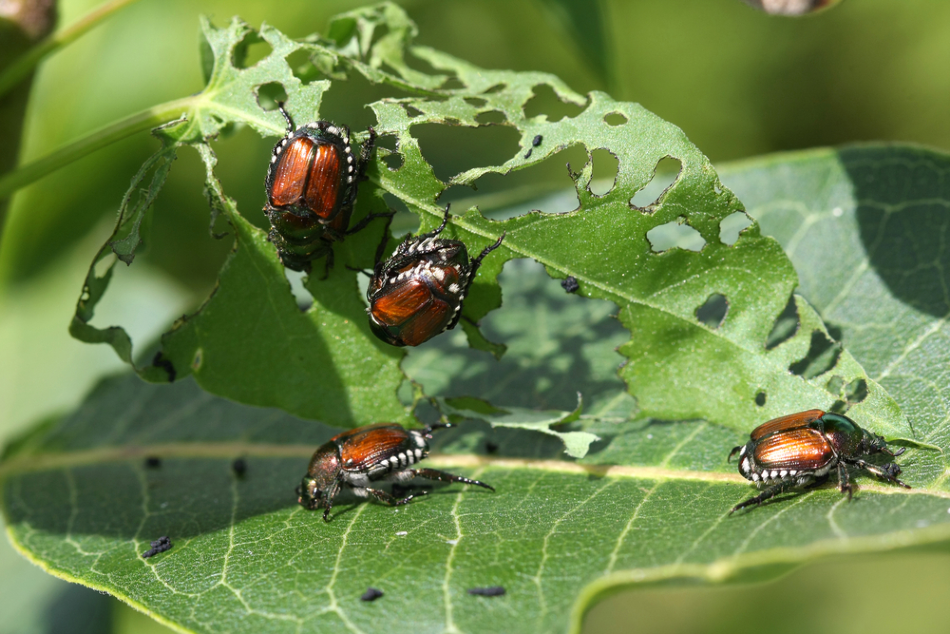Mar 25 2008

Image Credit: Ron Rowan Photography/Shutterstock.com
Article updated on 21/01/20 by Gaea Marelle Miranda
Atmospheric carbon dioxide levels are rising at an alarming rate in a variety of settings. In line with this, there are studies to indicate that soybean plant defenses go down as CO2 levels go up.
A study by the University of Illinois, through the Proceedings of the National Academy of Sciences, reported that elevated CO2 levels impair a key component of the plant’s defenses against leaf-eating insects.
Current Predictions of Atmospheric Carbon Dioxide
The estimated prevalence of carbon dioxide in the atmosphere is about 380 parts per million, which is 100 parts larger than its prevalence during the Industrial Revolution. However, for at least 600,000 years, the rate of carbon dioxide present in the atmosphere has been maintained at about 280 parts per million. This implies that activities during the past few centuries have significantly affected the increasing rate of carbon dioxide in the atmosphere.
Researchers are currently predicting that atmospheric carbon dioxide will reach 550 parts per million by the year 2050, and the rapid industrialization of India and China may even accelerate that timetable.
A study led by entomology professor and department head May Berenbaum used the Soybean Free Air Concentration Enrichment (Soy FACE) facility at the University of Illinois to test plant defenses in elevated CO2 environments. An open-air research lab was utilized to expose the plants in a soybean field to a variety of atmospheric CO2 and ozone levels without isolating the plants from other environmental influences, such as rainfall, sunlight, and insects.
.jpg)
Figure 1. Plant defenses go down as carbon dioxide levels go up, the researchers found. Soybeans grown at elevated CO2 levels attract many more adult Japanese beetles than plants grown at current atmospheric carbon dioxide levels (Credit: Photo courtesy of Evan Delucia.)
Photosynthesis and Atmospheric Carbon Dioxide
High atmospheric carbon dioxide is known to accelerate the rate of photosynthesis. It also increases the proportion of carbohydrates relative to nitrogen in plant leaves. The researchers from the University of Illinois sought to determine how such an altered carbon-to-nitrogen ratio affected the insects that fed on the plants. They predicted the insects would eat more leaves to meet their nitrogen needs.
When the researchers exposed the soybean field to elevated carbon dioxide levels, they saw the expected effect: soybeans in the test plot exhibited more signs of insect damage than those in nearby plots. A closer inspection showed that soybeans grown at elevated CO2 levels that attracted adult Japanese beetles, Western corn rootworms, and Asian soybean aphids, significantly more than soybeans in other plots. Caterpillars and other insect larvae need nitrogen to grow and build new tissues, but adult insects can survive and reproduce on a high carbohydrate diet. This would explain why adult insects would tend to migrate to high CO2 plants.
.jpg)
Figure 2. Plant defenses go down as carbon dioxide levels go up, the researchers found. Soybeans grown at elevated CO2 levels attract many more adult Japanese beetles than plants grown at current atmospheric carbon dioxide levels.(Credit: Photo courtesy of Evan Delucia.)
Beetles on High CO2 Lived Longer
To examine the role of high sugar levels in the leaves, the team allowed beetles to live out their lives in one of three conditions: on a high CO2 plant, on a low CO2 plant outside the Soy FACE plot, or a low CO2 plant grown outside the test plot but which had its sugar content artificially boosted.
The beetles on the high CO2 soybean plants lived longer, and as a result, they produced more offspring than those living outside the Soy FACE plot. Even those fed a supplemental diet of sugars did not see their life span extended.
The team then turned its attention to the hormonal signaling pathways of the plants, focusing on a key defensive chemical the plants produced to ward off an insect attack. When insects ate their leaves, soybeans and other plants produced a hormone—jasmonic acid—that starts a chain of chemical reactions in the leaves that boost their defenses. Normally, this cascade leads to the production of high levels of a protease inhibitor compound and when the insects ingest this enzyme, it inhibits their ability to digest the leaves.
.jpg)
Figure 3. Leaves grown under high CO2 lose a vital defense pathway, said U. of I. plant biology professor and department head Evan DeLucia, an author on the new study. (Credit: Photo by L. Brian Stauffer, U. of I. News Bureau.)
Leaves Grown under High CO2 Lose their Ability to Produce Jasmonic Acid
The researchers discovered that leaves grown under high CO2 levels lose their ability to produce jasmonic acid. Also, the whole defense pathway shuts down, leaving the plants undefended. The higher carbohydrate content of the leaves and the lack of chemical defenses allowed the adult insects to feast and live longer and produce more offspring.
The study provided insight into how multifaceted the global environment is. In this case, the effects of elevated carbon dioxide were shown to increase due to the presence of invasive insects in soybean plants. The researchers have since moved forward with this research, and they have focused on replicating the same process in other plants.
Source: the University of Illinois at Urbana-Champaign